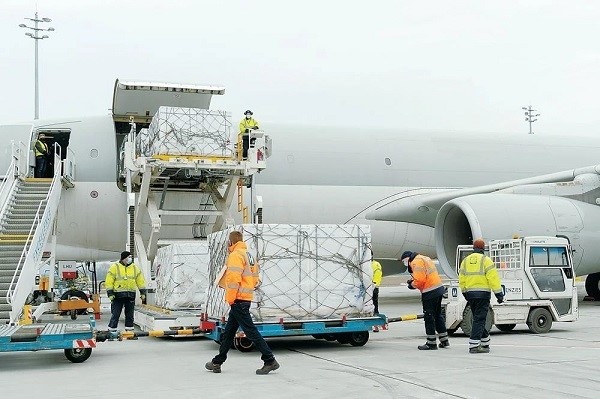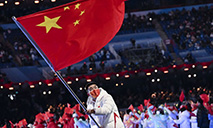To enhance cooperation on vaccines, jointly build immune barrier
Deputies called on the globe to unite closer for accelerated COVID-19 vaccination around the world at the UN General Assembly (UNGA) High-level Meeting on COVID-19 Vaccines held on Feb. 25.
Two years into the COVID-19 pandemic, the world is at a critical moment when unfair distribution of vaccines is severely hindering the global fight against the virus.

On Jan. 26, 2022, 300,000 doses of COVID-19 vaccines donated by China to Mali arrive in Bamako, capital of the African country. (Photo courtesy of the Chinese Embassy in Mali)
Just as UN General Assembly President Abdulla Shahid said, "Our strength lies in solidarity," mankind must unite together and strive to reach the goal of global vaccination as early as possible, so as to put the pandemic to an end soon.
Enhancing unity to fight COVID-19 is the first of the three major issues that deserve much thought and attention at present and over the coming period globally, told by Chinese President Xi Jinping to UN Secretary-General Antonio Guterres when the two met recently.
To achieve fair distribution of vaccines and fill the immunization gap is an urgent task. So far, over 10 billion doses of vaccines have been administered globally. However, only around 17 percent of the people in Africa have received at least one shot, and vaccination rate is lower than 10 percent in 27 countries.
As a provider of global public products, China is striving to build a global community of health for all. It has made important contribution to the global fight against the virus and won international acclaim.

Hungary received the first shipment of COVID-19 vaccines manufactured by China's Sinopharm on Feb. 16 and started administering them eight days later, becoming the first country in the EU to use Chinese vaccines. (Photo from sinopharm.com)
China actively advocates and practices solidarity in the fight against the COVID-19 pandemic. As a staunch supporter of global solidarity against the virus, China is the first country to make and practice the commitment to taking COVID-19 vaccines as a global public product.
Last year, Xi proposed the Global Vaccine Cooperation Action Initiative, aiming to enhance vaccine equity and accessibility in developing countries, so that the immune barrier would be built at an early date.
He stressed at the 2022 World Economic Forum Virtual Session that of particular importance is to fully leverage vaccines as a powerful weapon, ensure their equitable distribution, quicken vaccination and close the global immunization gap, so as to truly safeguard people's lives, health and livelihoods. Guterres expressed his thanks to China for the country's contribution to improving vaccine accessibility in developing countries.
China is the largest contributor to fair distribution of vaccines. As a country that delivers on its promises, China fully supports the UN target of administering vaccines to over 70 percent of the global population by mid-2022.
So far, China has provided over 2.1 billion doses of vaccines for more than 120 countries and international organizations, becoming the biggest provider of outbound vaccines among all countries. Half of the vaccine doses administered around the world were made in China. Most of the vaccines received by many countries, especially developing countries, came from China.
The vaccines provided by China have enhanced the capability, confidence and resolution of developing countries in the fight against the pandemic. Chief Executive of Global Alliance for Vaccines and Immunization Seth Berkley called China's efforts an important contribution to the global fight against the virus.

A new batch of anti-pandemic materials donated by the Chinese government to the Solomon Islands arrive in Honiara, capital of the Solomon Islands, Feb. 18, 2022. (Photo courtesy of the Chinese Embassy in Solomon Islands)
China is a devoted practitioner of joint vaccine production. It is among the earliest to support the waiver of COVID-19 vaccine intellectual property rights and to transfer technologies to developing countries. It has launched joint vaccine production with 20 countries, with an annual production capacity of one billion doses.
On Feb. 20, China and Egypt jointly donated 500,000 doses of COVID-19 vaccines to Palestine. It marked the first time for Egypt to send its locally produced COVID-19 vaccines abroad. Egypt's acting Health Minister Khaled Abdel-Ghaffar introduced that Egypt has so far produced more than 30 million doses of the vaccine, and their safety and efficiency are guaranteed. Through concrete actions, China has enhanced the vaccine production capacity of developing countries, setting a exemplary model of solidarity in the fight against the pandemic.
China is an active participant in multilateral cooperation on vaccines. It supports the World Health Organization in playing a central and coordinating role, and gives priority to the procurement needs of the COVAX Facility, to which China has supplied over 200 million doses of vaccines. China has also donated $100 million to the facility for the distribution of vaccines in developing countries.
At the UNGA High-level Meeting on COVID-19 Vaccines, China proposed to build a "safety net" for immunity, build up anti-pandemic "arsenals," improve the "governance shield" for health and strengthen the "anchor of stability" for development, which demonstrated the country's firm support for multilateral cooperation.
Photos
Related Stories
- Chinese mainland reports 75 new local COVID-19 cases Monday
- Hong Kong puts on united front against worst COVID-19 wave
- Mainland medical experts arrive in Hong Kong in fighting COVID-19
- COVID-19 takes huge toll on U.S. children: report
- Construction of mainland-aided isolation facility in Hong Kong completed in 1 week
- Experts call for caution as U.S. CDC updates mask recommendations
Copyright © 2022 People's Daily Online. All Rights Reserved.










